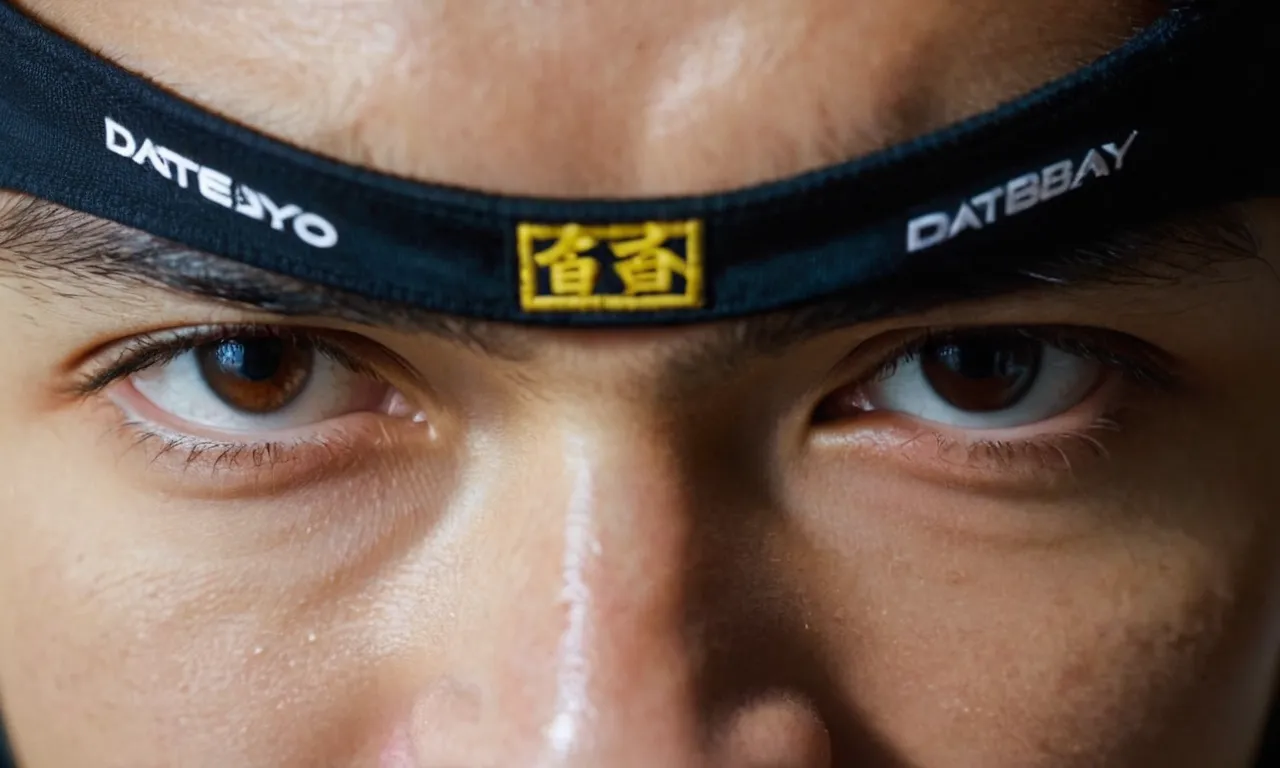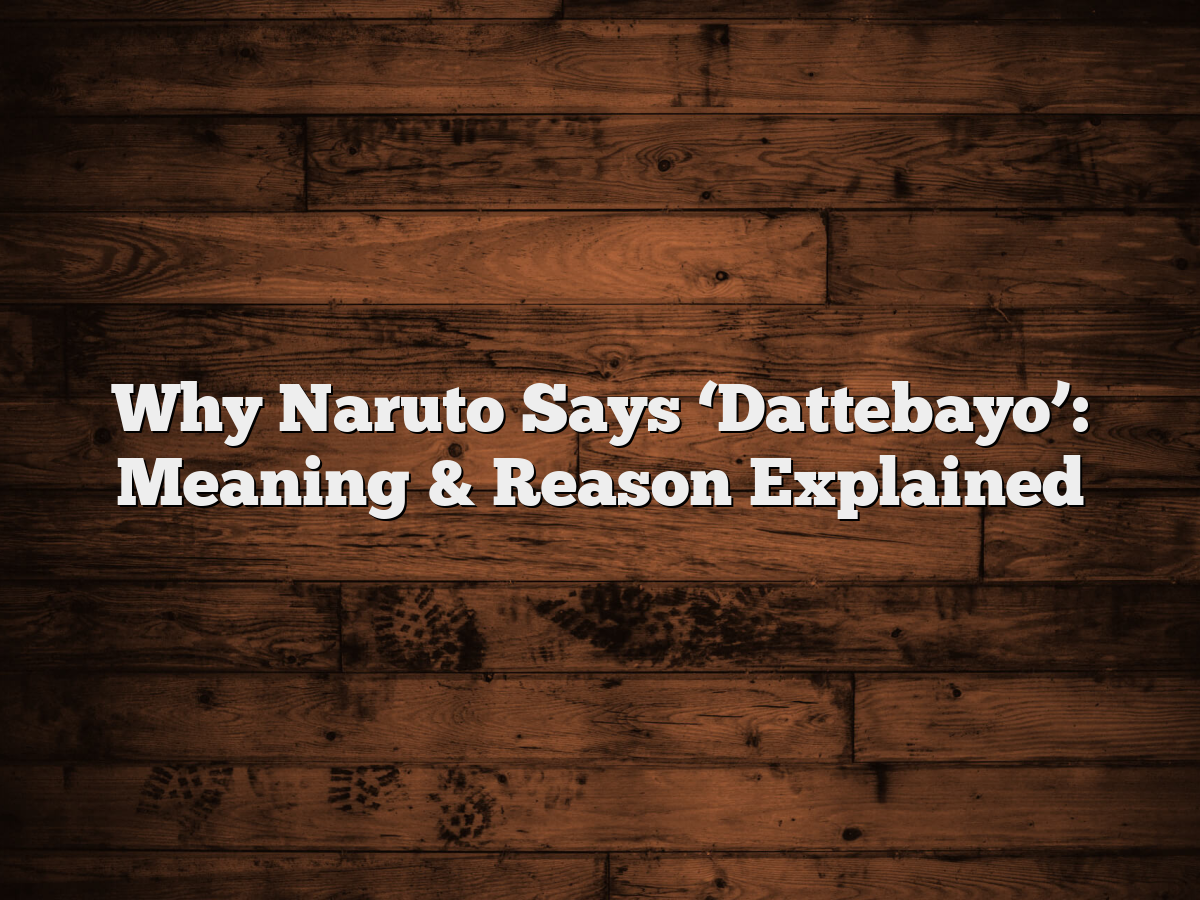Have you ever found yourself humming a tune from a show or, perhaps, repeating a funny phrase a character says? It's a pretty common thing, isn't it? Sometimes, a simple set of words, a little verbal habit, or a special way of speaking can really make a fictional person feel incredibly real and memorable. These little bits of language can actually become a sort of signature, a way for people watching or reading to instantly recognize and feel a connection with someone on screen or in a book. It's almost like a secret code that only fans truly get, and it helps to build a bond between the audience and the stories they love. This idea, of a character having a unique vocal mark, is something that creative minds often think about when they are bringing new personalities to life.
One very well-known instance of this kind of character trait comes from a hugely popular animated series. The person who created this particular story, Masashi Kishimoto, wanted to give his main character a distinct way of speaking, something that felt very much like a kid. He was looking for a phrase that would really show off this young ninja's spirited nature and, perhaps, his somewhat innocent way of looking at things, you know? It wasn't just about giving him words to say; it was about giving him a vocal signature, a sound that would belong to him alone and help define who he was. This specific sound, or set of words, needed to be something that would stick with people, something that would echo his personality without needing a lot of extra explanation.
And, as a matter of fact, when the creator thought about what that special way of speaking might be, a particular phrase, "dattebayo," simply came to mind. It seemed to fit the bill perfectly, offering a playful and distinct sound that could become a truly integral part of the character's identity. This choice wasn't just random; it was a deliberate move to give the character a vocal characteristic that would resonate with his youthfulness and his overall demeanor. It's really quite interesting how a small linguistic choice can have such a big impact on how we perceive a character, isn't it?
Table of Contents
- What's the Big Deal About Dattebayo?
- Who is Naruto Uzumaki and Why Does He Say Dattebayo?
- How Did Dattebayo Come to Be?
- Is Dattebayo Just a Catchphrase?
- What Does "Dattebayo" Actually Mean?
- How Do Fansubs Like Dattebayo Group Work?
- Other Language Quirks and Meanings
- A Quick Recap of Dattebayo's Place
What's the Big Deal About Dattebayo?
You might have heard this phrase, "dattebayo," pop up if you've spent any time watching popular animated shows from Japan. It’s a sound that, for many, immediately brings to mind a certain energetic, spiky-haired young ninja. But what exactly is the big deal about it, you know? Why does this particular set of sounds stick in people's minds so much? It’s more than just a random collection of syllables; it actually carries a bit of weight, especially when it comes to the character who says it. The way a character speaks can often tell you a lot about them, sometimes even more than what they actually do. This little phrase, in a way, became a verbal signature, a unique mark that helped to define a very well-loved figure in popular culture. It's pretty fascinating, too, how something so simple can become so iconic.
This particular phrase, "dattebayo," isn't just some filler word; it tends to be a key part of the character's identity. It's something that people associate with their personality, their way of facing challenges, and their general outlook on life. When you hear it, you almost instantly picture the character in your head, don't you? This kind of verbal tic can really help to solidify a character in the minds of the audience, making them feel more distinct and more alive. It’s a subtle but very powerful tool that storytellers use to make their creations feel more complete and more memorable. So, in some respects, the "big deal" about "dattebayo" is really about its role in character building and audience connection.
The impact of such a phrase goes beyond just the individual character, as a matter of fact. It becomes a part of the larger cultural conversation surrounding the story. Fans might use it among themselves, or it might be referenced in other media. This sort of linguistic ripple effect shows just how much a seemingly small detail can grow and become something much bigger. The phrase "dattebayo" has, in a way, become a shorthand for the character's spirit, a quick way to call to mind all of his qualities. It’s quite a testament to the power of simple, yet well-placed, verbal habits in storytelling, wouldn't you say?
Who is Naruto Uzumaki and Why Does He Say Dattebayo?
Naruto Uzumaki is, you know, the main character of a very popular story about ninjas. He's a young person who often gets into scrapes, but he has a very determined spirit and a strong desire to be recognized by those around him. He's known for his bright orange clothing and his never-give-up attitude. A big part of what makes him, well, him, is his way of speaking, particularly his habit of adding "dattebayo" to the end of his sentences. It’s a quirky little thing that really sets him apart from others in his world. This verbal habit isn't just a random sound; it's actually tied into who he is as a person and where he comes from.
Naruto Uzumaki - Key Character Details
| Role in Story | Main character, young ninja with big dreams |
| Defining Trait | Never-give-up attitude, desire for recognition |
| Verbal Habit | Often ends sentences with "dattebayo" |
| Inherited From | His mother, Kushina Uzumaki |
The creator of the story, Masashi Kishimoto, wanted to give Naruto a way of speaking that felt very much like a child, something that would show off his youthful spirit and perhaps his somewhat naive outlook on things. He believed that this phrase, "dattebayo," really fit Naruto's character well. It helps to make him feel more alive and more distinct. It serves as a sort of verbal tic that people associate with him, making him more memorable. It's a way for him to express himself that feels very authentic to his age and his personality, you know?
One of the interesting things about why Naruto says "dattebayo" is that he actually inherited it. The story explains that this particular way of speaking comes from his mother. So, it's not just a random quirk; it's a part of his family background, a little piece of his heritage that he carries with him. This detail adds a bit more depth to his character, showing that even his unique verbal habits have a history and a connection to his past. It's a subtle way of tying him to his origins, and it really adds to the overall richness of his personal story, wouldn't you say?
How Did Dattebayo Come to Be?
The idea for "dattebayo" as a character's catchphrase, or verbal signature, came directly from the mind of the story's creator, Masashi Kishimoto. He was looking for something that would give his main character, Naruto, a childlike quality in his speech. It needed to be something that felt natural for a young, spirited person to say, a bit informal, and perhaps a little bit emphatic. When he considered different options, "dattebayo" simply came to mind as a suitable choice. It's quite interesting how a creative idea can just pop into someone's head and then become such a significant part of a character's identity, isn't it?
The creator had a clear belief that this phrase really went well with Naruto's overall personality. It wasn't just about having a unique sound; it was about having a sound that actually complemented the character's traits, his youthful energy, and his direct way of expressing himself. In a way, it served as a verbal exclamation point, a way for Naruto to emphasize his feelings or his point without having to use overly complex words. This choice helped to make the character feel more complete and more authentic to the kind of person he was meant to be, which is really quite clever.
Moreover, the phrase "dattebayo" isn't just a random invention for Naruto; it has a bit of a backstory within the narrative itself. The story tells us that Naruto actually got this particular verbal habit from his mother. This means that it's a part of his family's way of speaking, a little piece of his personal history that he carries with him. This kind of inherited trait can add a lot of depth to a character, showing how their personal quirks are sometimes rooted in their background and the people who came before them. It makes the phrase feel more organic to the character's world, rather than just a simple addition, don't you think?
Is Dattebayo Just a Catchphrase?
When we think about "dattebayo," it’s easy to label it as just a catchphrase, something a character says often. But is that really all it is? Perhaps it's a bit more than that, in some respects. A catchphrase is typically a memorable line that becomes associated with a character, and "dattebayo" certainly fits that description. However, its use by Naruto goes a little deeper than just being a repeated line. It often acts as a way for him to add emphasis to what he's saying, a sort of verbal exclamation mark that signals his conviction or excitement. It’s a subtle way of communicating his inner state without needing to spell it out directly.
Consider how it's used in different situations. Sometimes, it might be a sign of his frustration, other times it could be a way to show his determination, or even just a simple way to express his general enthusiasm. This variation in its use suggests that it's not just a static phrase; it's a dynamic part of his speech pattern that reflects his emotional state. It's almost like a verbal tic that provides insight into his feelings at a given moment. So, while it definitely functions as a memorable catchphrase, it also serves a more expressive purpose within the character's dialogue, wouldn't you say?
Furthermore, the fact that it's inherited from his mother adds another layer to its meaning. It connects him to his past and gives his speech a personal history. This makes it more than just a simple verbal habit; it becomes a symbol of his lineage and the traits he carries from his family. In this way, "dattebayo" is not just a catchphrase; it's a piece of his identity, a reflection of his personality, and a subtle link to his background. It really does add a lot to the character, making him feel more real and more deeply rooted in his story, you know?
What Does "Dattebayo" Actually Mean?
Now, this is where things get a little interesting, because the exact "dattebayo meaning" isn't always straightforward. When you look at the original Japanese, "dattebayo" is a sort of informal, emphatic ending to a sentence. It’s a bit like saying "you know!" or "believe it!" or "I'm telling you!" in English, but it carries a very specific youthful and somewhat boisterous feel. It's not a formal word that you'd find in a dictionary with a single, precise definition. Instead, its meaning comes from how it's used and the feeling it conveys. It's often used by younger people, and it can add a sense of confidence or even a touch of stubbornness to what's being said, you know?
The choice to translate "dattebayo" into "believe it!" in the English versions of the story was a way to capture that emphatic, determined spirit of the character. While it doesn't directly translate word for word, "believe it!" does a pretty good job of conveying Naruto's conviction and his tendency to state things with a lot of certainty, even when he might be feeling a bit unsure inside. It's a creative decision made by those who adapted the story for English-speaking audiences, aiming to preserve the essence of the original phrase's impact on the character. So, in some respects, the "dattebayo meaning" in English is "believe it!" because it reflects the character's attitude rather than a literal word-for-word translation.
It's also worth noting that the "exact meaning depends on which country you're from," which means how people interpret or translate such informal phrases can vary quite a bit across different languages and cultures. What works well in one language to convey a certain feeling might not translate perfectly into another. This is why you see variations in how these sorts of verbal tics are handled in different dubbed or subtitled versions of shows. The goal is always to capture the spirit and intent, even if the literal words are different. So, the "dattebayo meaning" really hinges on cultural and linguistic context, making it a rather fascinating bit of language, wouldn't you agree?
How Do Fansubs Like Dattebayo Group Work?
Speaking of translations and interpretations, you might have heard of groups called "fansubs." One such group is actually named "Dattebayo," which is pretty neat, isn't it? These groups play a really important role in how many people around the world get to watch animated shows and other media from Japan. Basically, what a fansub group like Dattebayo does is take original Japanese shows, like Naruto and Bleach, and then they translate them into English. This isn't a formal, official translation done by big companies; it's usually done by fans who are passionate about the shows and want to share them with a wider audience.
Once they've translated the show, they then add subtitles to the video files, making it possible for people who don't understand Japanese to follow along with the story. After all that work, they release these translated versions on the internet for free. This means that fans all over the globe can watch shows that might not yet be officially available in their region, or perhaps never will be. It's a way for communities of fans to share their favorite content and make it accessible to others who share their interests. This process requires a lot of dedication and a pretty good grasp of both languages, you know, to make sure the meaning comes across well.
The existence of groups like the Dattebayo fansub group highlights how much people want to connect with stories from different cultures. They fill a gap that official releases might not always cover, especially in the early days of global media sharing. It’s a testament to the power of fan communities and their willingness to put in effort to share what they love. So, when you think about "dattebayo meaning," you might also think about the group that helped bring those stories to many people, which is really quite a significant contribution, don't you think?
Other Language Quirks and Meanings
Our language is full of interesting quirks, isn't it? Beyond "dattebayo meaning," there are so many other ways that words and phrases take on different meanings or are used in unexpected ways. Take, for example, the word "ecchi." This term actually comes from the Japanese pronunciation of the letter "H." In English, "H" sounds like "aitch," but in Japanese, it sounds a bit like "e-chi." This sound was then used as a shorthand for "hentai," which means something perverted. However, over time, "ecchi" itself became a general, somewhat softer way to talk about sex or sexual topics, a kind of euphemism. It’s a good example of how a sound can evolve into a word with its own unique cultural meaning, you know?
Then there's "nyanpasu," a greeting phrase that comes from a character named Renge Miyauchi in another animated show. It's a phrase created by a grade 1 elementary school student character, and it’s meant to be a simple, somewhat silly greeting. It’s a bit like a playful "hello" or "good morning" that doesn't have a deep, traditional meaning but rather gets its charm from the character who says it and the context of the show. This shows how new phrases can actually be born from creative works and then gain popularity, even if they started out as something quite simple or even nonsensical, which is pretty cool.
And what about the idea of an "outbrief"? Someone might say, "Oh, dude, an outbrief is basically like a debrief but, you know, out of the room." This informal explanation perfectly captures how language adapts and how people describe concepts in everyday conversation. It’s when you wrap up a meeting or a project and give a summary of what went down. It’s a practical term, but the informal way it’s described shows how we use language to make things understandable to each other, even if it's not a formal definition. These examples, including "dattebayo meaning," really highlight how flexible and creative language can be, and how its true sense often comes from its use in real-world situations.
A Quick Recap of Dattebayo's Place
So, we've talked about how "dattebayo" came to be, starting with the creator's wish


